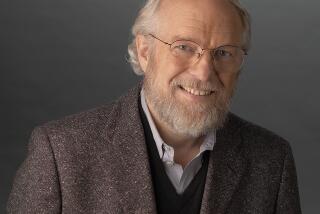WEST OF EDENThe End of Innocence at...
- Share via
WEST OF EDEN
The End of Innocence at Apple Computer by Frank Rose (Viking: $19.95)
The height of euphoria at Apple Computer came at a 1983 conference in Honolulu’s Civic Auditorium, which began with loudspeakers blaring music from “Flashdance.” The music died down and Steven Jobs walked on stage. “It is 1958! IBM passes up the chance to buy a young company that has just invented a new technology called Xerography,” he shouted, going on to recount other major mistakes made by “Orwellian” companies such as IBM. “Will Big Blue dominate the entire Information Age? Was George Orwell right ?” “No,” the audience responded. “No, no, no !” A screen descended from the stage and a 60-second commercial for Apple showed a woman fleeing gray, slack-jawed drones. “On Jan. 24, Apple will introduce Macintosh,” a voice intoned, “and you’ll see why 1984 won’t be like 1984.”
Apple’s story has the makings of great drama, for while Jobs and his disciples, most in their 20s, were at the height of their youthful self-aggrandizement during that conference, they were also on the verge of their downfall. The unbridled creativity that had been so successful in fueling Apple’s early success was increasingly appearing inadequate to the task of managing a multibillion-dollar corporation. The bad omens for Jobs began several days after the conference, when the company’s board of directors rejected the Orwellian ad; it didn’t show the product, they pointed out, and barely even mentioned the name “computer.” Several months later, Apple’s board replaced Jobs with John Sculley, the middle-aged former president of Pepsi. This story has been told before in Sculley’s autobiography and in Jeffrey Young’s biography of Jobs, both published in 1987, but while these books were critically panned for bad writing, “West of Eden” vividly depicts the marketing culture represented by Sculley and the computer counterculture represented by Jobs, thus adding dramatic force to the moment when these two worlds collide.
Typical of Apple’s early days is hardware designer Burrell Smith, “a hobbit-like little man, short on social graces and all but innocent of personal hygiene, with the chopped off blond curls of a 14th-Century monk. His technique was to take home a bunch of parts, spread them all out on his bed, smoke a couple of joints, and sit there grooving on everything. Sooner or later, patterns would start to take shape in his mind.” Sculley, by contrast, is depicted as a savvy marketer in chapters that describe the job of image-making more engagingly than many earlier books on advertising, such as Stephen Fox’s 1984 work, “The Mirror Makers.”
If there is a flaw in Rose’s engaging history, it is his depiction of Jobs as the loser in this tale. “West of Eden” concludes by pointing to the gash in the side of Jobs’ computer, where he gouged out the Apple logo. But now that the new Apple has become as slow to introduce innovations as its “big brother” IBM was in the early 1980s, the degree to which Apple has benefitted by ending its era of “innocence” remains unclear.
More to Read
Sign up for our Book Club newsletter
Get the latest news, events and more from the Los Angeles Times Book Club, and help us get L.A. reading and talking.
You may occasionally receive promotional content from the Los Angeles Times.









